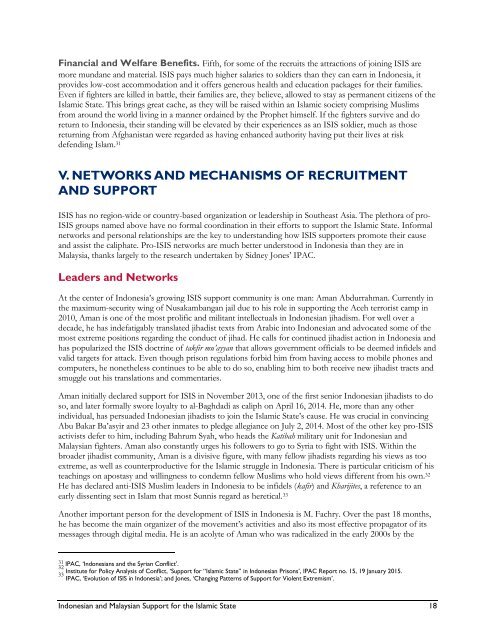INDONESIAN AND MALAYSIAN SUPPORT FOR THE ISLAMIC STATE (FINAL REPORT)
CVE_IndonesianMalaysianSupportforISIS
CVE_IndonesianMalaysianSupportforISIS
You also want an ePaper? Increase the reach of your titles
YUMPU automatically turns print PDFs into web optimized ePapers that Google loves.
Financial and Welfare Benefits. Fifth, for some of the recruits the attractions of joining ISIS are<br />
more mundane and material. ISIS pays much higher salaries to soldiers than they can earn in Indonesia, it<br />
provides low-cost accommodation and it offers generous health and education packages for their families.<br />
Even if fighters are killed in battle, their families are, they believe, allowed to stay as permanent citizens of the<br />
Islamic State. This brings great cache, as they will be raised within an Islamic society comprising Muslims<br />
from around the world living in a manner ordained by the Prophet himself. If the fighters survive and do<br />
return to Indonesia, their standing will be elevated by their experiences as an ISIS soldier, much as those<br />
returning from Afghanistan were regarded as having enhanced authority having put their lives at risk<br />
defending Islam. 31<br />
V. NETWORKS <strong>AND</strong> MECHANISMS OF RECRUITMENT<br />
<strong>AND</strong> <strong>SUPPORT</strong><br />
ISIS has no region-wide or country-based organization or leadership in Southeast Asia. The plethora of pro-<br />
ISIS groups named above have no formal coordination in their efforts to support the Islamic State. Informal<br />
networks and personal relationships are the key to understanding how ISIS supporters promote their cause<br />
and assist the caliphate. Pro-ISIS networks are much better understood in Indonesia than they are in<br />
Malaysia, thanks largely to the research undertaken by Sidney Jones’ IPAC.<br />
Leaders and Networks<br />
At the center of Indonesia’s growing ISIS support community is one man: Aman Abdurrahman. Currently in<br />
the maximum-security wing of Nusakambangan jail due to his role in supporting the Aceh terrorist camp in<br />
2010, Aman is one of the most prolific and militant intellectuals in Indonesian jihadism. For well over a<br />
decade, he has indefatigably translated jihadist texts from Arabic into Indonesian and advocated some of the<br />
most extreme positions regarding the conduct of jihad. He calls for continued jihadist action in Indonesia and<br />
has popularized the ISIS doctrine of takfir mu’ayyan that allows government officials to be deemed infidels and<br />
valid targets for attack. Even though prison regulations forbid him from having access to mobile phones and<br />
computers, he nonetheless continues to be able to do so, enabling him to both receive new jihadist tracts and<br />
smuggle out his translations and commentaries.<br />
Aman initially declared support for ISIS in November 2013, one of the first senior Indonesian jihadists to do<br />
so, and later formally swore loyalty to al-Baghdadi as caliph on April 16, 2014. He, more than any other<br />
individual, has persuaded Indonesian jihadists to join the Islamic State’s cause. He was crucial in convincing<br />
Abu Bakar Ba’asyir and 23 other inmates to pledge allegiance on July 2, 2014. Most of the other key pro-ISIS<br />
activists defer to him, including Bahrum Syah, who heads the Katibah military unit for Indonesian and<br />
Malaysian fighters. Aman also constantly urges his followers to go to Syria to fight with ISIS. Within the<br />
broader jihadist community, Aman is a divisive figure, with many fellow jihadists regarding his views as too<br />
extreme, as well as counterproductive for the Islamic struggle in Indonesia. There is particular criticism of his<br />
teachings on apostasy and willingness to condemn fellow Muslims who hold views different from his own. 32<br />
He has declared anti-ISIS Muslim leaders in Indonesia to be infidels (kafir) and Kharijites, a reference to an<br />
early dissenting sect in Islam that most Sunnis regard as heretical. 33<br />
Another important person for the development of ISIS in Indonesia is M. Fachry. Over the past 18 months,<br />
he has become the main organizer of the movement’s activities and also its most effective propagator of its<br />
messages through digital media. He is an acolyte of Aman who was radicalized in the early 2000s by the<br />
31 IPAC, ‘Indonesians and the Syrian Conflict’.<br />
32 Institute for Policy Analysis of Conflict, ‘Support for “Islamic State” in Indonesian Prisons’, IPAC Report no. 15, 19 January 2015.<br />
33 IPAC, ‘Evolution of ISIS in Indonesia’; and Jones, ‘Changing Patterns of Support for Violent Extremism’.<br />
Indonesian and Malaysian Support for the Islamic State 18


